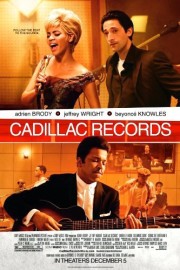Cadillac Records
Back in my studies at Georgia State, in a class entitled “Legal Aspects of the Music Industry,” our teacher had us read “Hit Man” by Fredric Dannen, which looks at how business has evolved in the music industry from the early days of Tin Pan Alley to the product-driven ’80s, and the decadence and lawlessness that has developed over the years. I always thought the book would make quite a film- with either Scorsese or Altman at the helm- but alas, no one has ever taken up the task…probably because it’s true, and a lot of people would get burned in the process.
That’s cool. Gives me a possibility of having it all to myself when my filmmaking career hits the ground running. Until then, we’ll just have to settle with movies like “Cadillac Records,” which takes a look at the early days of the business of the Blues, with Chicago’s Chess Records at the center of a musical boom. The talents that came out of that mecca of modern music? Chuck Berry, Etta James, Little Walter, and Muddy Waters.
In her film, writer-director Darnell Martin centers in on the two people whose collaboration led to its’ rise- the blue-collar Leonard Chess (Adrian Brody), who went from working in junk to running a club to producing the forementioned-artists’ hits, and Muddy Waters (Jeffrey Wright), who used to spend his days singing in the fields down South before making his way to Chi-town to play guitar on the streets. When Waters and his bandmates- including volatile harmonica player Little Walter (the excellent Columbus Short)- get into a mini Battle of the Bands at Chess’ club, and end up driving away business, Leon takes notice. He knows talent when he sees it. It’s not long before he and Waters are building their own studio (where payment comes in the form of Cadillacs), peddling their records to radio in town and down South, and business is booming, with Chess bringing in a veritable who’s who of the African American music scene in the ’40s and ’50s.
But with great success comes the opportunity for great temptation, and like many rags-to-riches stories before it (think “GoodFellas,” “Boogie Nights,” “Ray”), it’s not long before the main characters in Martin’s film are letting fame go too much to their heads. It’s at these points when it’s impossible not to compare “Cadillac Records” from those films. But what makes this film stand on its’ own are the performances. Brody gives his best turn since “The Pianist” as a wheeler-and-dealer who can play hardball, but nonetheless feels sympathetic to the troubles his artist’s get themselves into. Matching him beat-for-beat is Wright (so underused in “Quantum of Solace”), who finds the rebellious soul of Waters that reverberates in hits like “Mannish Boy,” but gets him in trouble with his wife (Gabrielle Union) at home. In smaller roles, Mos Def brings the defiant spirit of Chuck Berry home in a performance that goes beyond anything the actor has done previously; in a less-competitive year, an Oscar nod might not be out of the question. Standing a better shot in that front is Beyonce Knowles as Etta James, a diva with the voice of an angel in classics like “At Last,” and someone who becomes a thorny proposition for Chess, especially when she OD’s at home and gets herself deep in debt. But rock n’ roll isn’t about playing it safe; it’s about having fun, and finding your unique voice in a sea of pretenders. Very little of the music in “Cadillac Records” put out by Chess and co. would be classified as rock now, but in their voices, you can hear the defiance of conformity to come.










